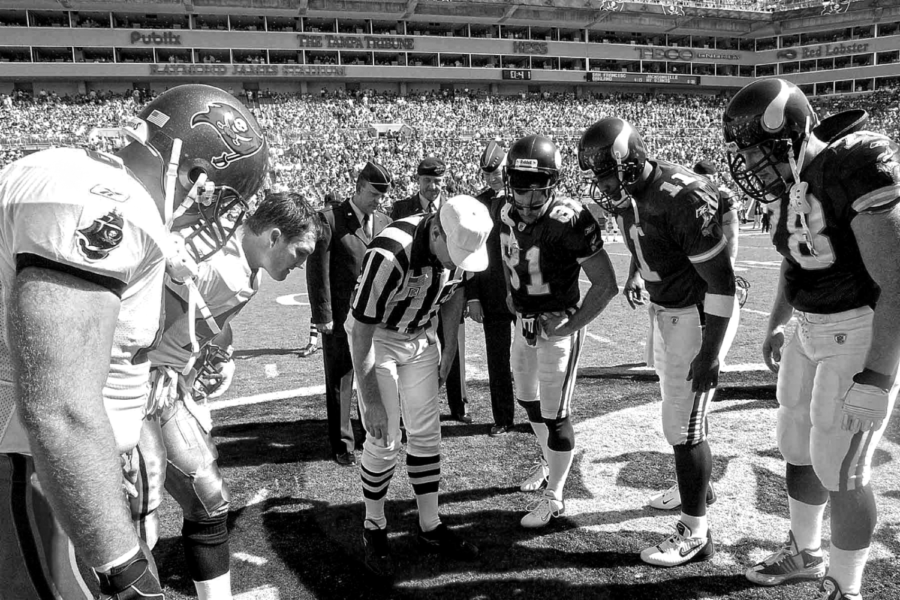The Problem with O.T.
NFL players look intently to the ground to see the result of the coin toss.
On January 23, 2022, there were several great quarter-final playoff football games. All of them came down to just one score, but the game that caught my eye the most was the Chiefs vs. Bills game, which went to overtime after the two teams scored a total of 25 combined points in the final two minutes of the fourth quarter. And on it went to overtime. A coin toss determines which team receives and which team kicks. In this case, it turned out to be the Chiefs who won the coin toss and received. With just one drive down the field and a Chiefs touchdown on the opening possession of overtime, the game was complete and the Bills didn’t even get an opportunity to obtain a score of their own. Although 43 million people watched this game, this ending was mildly anticlimactic, as the rest of the game was a scoring fest between two evenly matched teams. Many fans and viewers of the game were left wondering: Why didn’t the Bills get a drive of their own?
In the NFL, when a game goes to overtime, there is a coin toss that determines which team gets the ball first. The first team to score a touchdown automatically wins the game and if both teams score a field goal, the next score, regardless of a touchdown or a field goal, wins the game. The team that receives the ball first is at an advantage, even more so in the playoffs. Of the 11 playoff games in NFL history that have gone to overtime, 10 of them were won by the receiving team and only 1 was won by the kicking team. With these results, 90.9% of the overtime games are won by teams who won the coin toss. When looking at these statistics, one might as well just hand the game to the toss winner, which is even more of a crime in an overtime game.
It is more than clear that these rules need to go. The rules shorten the game. This makes it highly unlikely that the game will go to more than one overtime, effectively allowing television coverage to move on to the next air time. This is important for both broadcast companies and the NFL itself, but at the end of the day, it corrupts the integrity of the game. If a team is tied up after 4 quarters, the game in regulation was a back and forth match that was more than entertaining, but in overtime, each team is unable to prove their abilities. Fans pay a lot of money to go to an NFL game, but with these overtime rules, they don’t get their money’s worth because while they do watch a great game in regulation, in overtime it is unfair and the team one may be rooting for can easily be gypped. And others may say that defense wins games and therefore these rules are just fine. But in reality, by the time overtime comes around, both teams are exhausted and are unable to play to the best of their ability. While this statement could be used to say that there should be no overtime at all, overtime is more than necessary because instead of player talent, coaching talent is highlighted in overtime. It becomes more about the plays than the players. Therefore, there is no way to tell who should have won the game with just one team receiving an offensive possession.
In reality, both teams need a possession in overtime to demonstrate their merit. The NFL should implement rules similar to college football. At the collegiate level, while there is a coin toss to determine which team receives the ball first, each team gets an offensive possession in overtime. There is no kickoff and the ball is placed at the 25-yard line. These rules are much fairer because each team is allotted a possession of offense and defense to demonstrate their talent. Shortly, I hope to see an alteration of the NFL overtime rules to create a more equal system.
Let’s face it. When the game is fairer, all elements of the game are rejuvenated and the competition between teams is purer and contains less luck and more skill. Every game in the season is important, even more so in the NFL where there are only 17 games played in the regular season. Each win or loss has a defined impact on the chances of making the playoffs, so with such skewed odds in overtime, these rules can even be the difference between making or being just shy of the playoffs. I envision a better future for the NFL, and it all starts with the tampering of overtime rules to transform the game into a more coaching/skill-oriented game than a gambling game over a single coin toss.

Jonathan Stafford is a senior at Boulder High School this year and will be taking on the role of editor-in-chief. This is his third year with The Owl. He has always liked writing and sharing his opinions. He looks forward to sharing his thoughts and opinions with the Boulder High community. When not in school, Jonny enjoys playing basketball and baseball, fantasy football, hanging out with friends and family, and being out in nature. He feels that journalism is a great way to educate the general population while expressing his own opinions. One debate he feels passionate about is the grape debate. When it comes to this debate, he feels that purple grapes are superior to any other type of grape.


